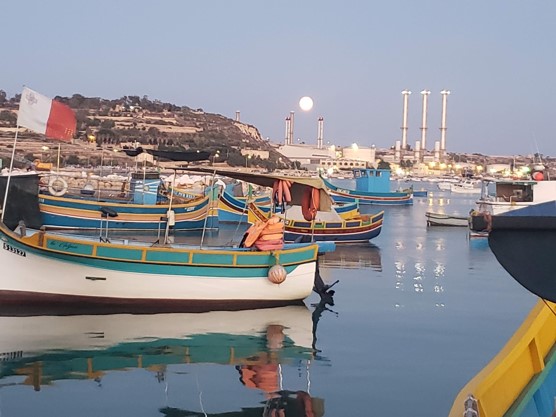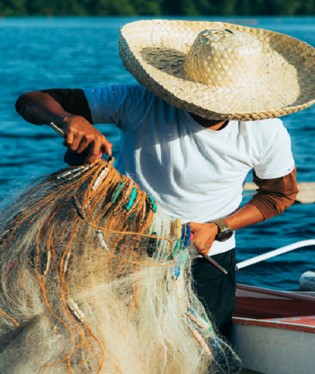Workers' Stories in the COVID-19 Era: Installment #9
August 25, 2021
Written by Suzanne Spiteri (PhD candidate, Sociology)
Edited by Christina Love (Undergraduate student, Indigenous Studies & French)
In this installment of the Workers' Stories in the COVID-19 Era dialogue series, we interviewed Joseph, a small-scale commercial fisherman in the Republic of Malta. In the dialogue below, Joseph discusses not only how the COVID-19 pandemic has impacted his life and his industry, but also discuses how issues of neo-colonialism and neo-liberalism further exacerbate the effects of this global health crisis.
For privacy, all names have been changed to protect the identities of our interviewees.
INTERVIEW
Suzanne: Can you tell me what you do for a living, how long you have been doing it, and what your work entails?
Joseph: I have been an independent small-scale fisherman here in Malta for about 30 years, since I was a little boy. My profession is a long-standing tradition in Malta and Gozo. I chose to follow in the footsteps of my ancestors, and I try to make a living from the land and the sea as my father and grandfather did. I used to fish with my father and that’s how he supported our family. Now, it’s how I support mine.
I chose to follow in the footsteps of my ancestors, and I try to make a living from the land and the sea as my father and grandfather did.
What my work entails is pretty self-explanatory. I own my own fishing boat, a medium sized offshore fishing boat. Every morning I wake up, I head out, I use my fish-finder technology to direct me, I catch what I can for the day, and I head back and sell my fish to the local fish market, or directly to a restaurant or a customer.

Suzanne: Has the COVID-19 pandemic changed your work?
Joseph: On top of everything else us fishermen have had to go through recently, this pandemic has almost ruined my life; it has ruined my livelihood that’s for sure. Maltese small scale legitimate fishermen can barley survive as it is with diminishing fish stocks, the endangerment of Bluefin tuna, new EU restrictions on swordfish season, the industrial trawlers that are clearing the Mediterranean Sea, and the sale of “black fish.” With the pandemic and no tourists coming in, and no restaurants needing fish for tourists, it got even worse. When the government closed the restaurants to prevent the spread of the virus, I practically couldn’t sell any fish at all.
Suzanne: And you could not sell any fish because there was no market for the fish anymore?
Joseph: No, there is still a market of course; the Maltese people still needed fish for food. While the restaurants were still open, they still needed fish even though the tourists were not coming for their Maltese customers.
It was a smaller market of course. During the summers here in Malta we have a million tourists, so the demand goes up. Even in the winters we still need to eat ourselves, but the sale of “black fish” almost starved my family during COVID.
Listen, to tell the truth, the sale of “black fish” is always a very big problem for us small scale legitimate fishermen but when tourists are here, we can make it. However, when the borders are closed and the restaurants are closed and everyone is buying “black fish,” how can I survive?
Suzanne: Can you tell me what you mean by “black-fish” and how its sale affects you?
Joseph: “Black fish” is the illegal selling of fish caught by unlicensed and unregulated fishermen in Malta. Basically, anyone can go out and catch fish in Malta, no license required, but you need to be a licensed and registered fisherman to be able to legally sell your fish.
As a legitimate fisher I have to pay for my license and registration, I have to keep my boat a particular way, and if I hire an apprentice, I have to pay wages the government has approved. All of this costs money. I have to claim the money I earn and I pay taxes. I also have a maximum number of fish I can catch and I have to declare my fish sales to be able to keep my commercial license. Meanwhile, these guys just jump in their boats with friends or their sons, they catch whatever they want, whatever they can, and they go and sell it for cash, and of course their prices are cheaper than mine because they had to pay nothing to catch them.
With all the police corruption, nobody even cares. They just get to keep doing it, meanwhile they destroy the sea and the legitimate market for fish on the islands.
With all the police corruption, nobody even cares. They just get to keep doing it, meanwhile they destroy the sea and the legitimate market for fish on the islands.
Suzanne: So, you were unable to sell your fish because tourists stopped coming into the islands and locals turned to the sale of “black fish”?
Joseph: Exactly, and I am pissed off about it. The fish market acts as the middleman for us. We take our fish there and sell directly to restaurants or suppliers, so they come to us basically. But when it closed due to COVID precautions, we had to start going directly to the restaurants. So, I’d go into a restaurant and I’d say I have this type of fish and this many kilos, and they’d tell me, “No. I just bought the same fish, for €1 − €2/ per kilo less.” Of course, when you don’t have to pay licenses or anything to catch fish, you’re able to undercut legitimate fishers and sell for cheaper.
Even to sell directly to locals, during COVID half of Malta stopped working and the government gave out vouchers for around €800 a month, so people couldn’t afford to buy fish that was caught properly and according to the law; they had to go for the lowest prices they could find. That’s not their fault; we all need to survive, but I need to survive too. I can’t lower my prices because soon I won’t be making any money doing this anymore.
Sicilian, Libyan, and Tunisian fishermen come and they catch more fish than what we are ever allowed to, and in contested waters. They can take it back and sell it and feed their families. Local “black fishermen” are the same; they overfish and don’t pay taxes. But what about me? What about us? We do everything right according to the books and the laws so why would my family have nothing to eat if we didn’t have fish?
Suzanne: How could this situation have been improved for you and other small-scale fishermen during the pandemic?
Joseph: During the pandemic we needed help from the government, that’s it. As self-employed workers, we got nothing. The government gave all unemployed employees a benefit of €800 per month and vouchers, and they gave a monthly grant to mothers who had to stay home to take care of their children and disabled people, but there was nothing for us self-employed. All of us fishermen who don’t work for the international “Big Fish” companies were in the same situation. Even the people who work in the markets (local artisan markets) spend loads of money per year on permits and licenses and then in the face of a pandemic, they closed everything and they left us to fend for ourselves.
But more than just some basic pandemic benefits, we need two things. The Maltese government has to stop turning a blind eye to illegal fishers who are undercutting Maltese people who are involved in our traditional Maltese ways of living, and who are trying to do it with respect to the laws. From the local police all the way to the very top, the Prime Minister and the President all know about how the sale of “black fish” is affecting our lives and our livelihood but will do nothing to stop it. The corruption in Malta is so intense that you cannot make a traditional living and be an honest man anymore.

The second thing we need is for our government to stop kissing the EU’s ass and take back control of the islands that should have never belonged to Europe in the first place. In 1800 the British came and colonized us, and now it’s 2021 and we are begging these same European powers to send us their tourists and their corporations, to destroy our lands and our seas for their own profit!
In 1800 the British came and colonized us, and now it’s 2021 and we are begging these same European powers to send us their tourists and their corporations, to destroy our lands and our seas for their own profit!
It was our government that bowed down and allowed these commercial, sea-sweeping trawlers to clean out our sea. It was our government that sold our tuna ranching rights to just five companies, all foreign-owned. It’s corrupt and I don’t know how our way of life will survive it this continues.
Suzanne: I understand that the pandemic has caused you a lot of financial harm on top of all of these practices and policies. Can I ask, how do you feel about being, or staying, a fisherman now?
Joseph: It doesn’t matter how I feel. I have no choices now. It’s too late for me. I wanted to honour my country and my traditions by continuing to work in a way my father and forefathers did, in a way that I thought would honour the land and the sea, but the pandemic showed me that I will be left behind by change, that my country will not protect me. I could barley afford to keep food in the mouths of my wife and children, but everyone who works in the offices, on the computers, on the internet kept their jobs. I used to wish that one of my sons would take over my boat, but now I tell them to stick to school. This is no way to live anymore.
[T]he pandemic showed me that I will be left behind by change, that my country will not protect me.
Suzanne: Is there anything else that you would like to share?
Joseph: All I want to say is all around the world people lost their lives and they lost their livelihoods, but in some places, people are more unfairly impacted than in others. Everything that was unfair before, and has always been unfair, is worse now. The poor get poorer, the sick get sicker, the rich get richer.
